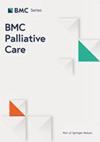全科医生在护理有姑息关怀需求的病人时的心理压力:一项探索性研究
IF 2.5
2区 医学
Q2 HEALTH CARE SCIENCES & SERVICES
引用次数: 0
摘要
在德国,全科医生在提供姑息关怀方面发挥着举足轻重的作用。照顾有姑息关怀需求的病人对全科医生来说是一种负担,这凸显了自我保健和心理健康支持的重要性。本研究旨在探讨姑息关怀在全科医生日常工作中所扮演的角色、他们所承受的压力、他们的应对机制以及在这种情况下预先关怀规划的潜在益处。研究采用了一种探索性方法,将简短的定量调查与定性访谈相结合。分析以结构化定性内容分析为基础,遵循演绎-归纳程序,并结合了压力-应变模型和拉扎勒斯的压力与应对事务模型。我们招募了 11 名全科医生参与研究。全科医生认为姑息关怀是他们实践中不可或缺的一部分,但也面临着时间限制和专业知识差距等挑战。社会禁忌往往阻碍了有关死亡话题的对话。大多数全科医生都在等待病人主动提出这个话题。一些全科医生认为姑息关怀的某些方面可能会令人痛苦。他们采用了以问题为中心的应对策略(避免负面压力、安排日常日程)和以情感为中心的应对策略(与同事讨论)。尽管如此,全科医生仍表示希望获得具体的心理支持方案。尽管预先护理计划相对陌生,但它被认为对生命末期谈话很有价值。姑息关怀可能会给全科医生带来负面的心理压力,这些压力往往来自外部因素。尽管已经制定了个人应对策略,但还是应该探索专业心理疏导的概念。未注册。本文章由计算机程序翻译,如有差异,请以英文原文为准。
Psychological stress of general practitioners in the care of patients with palliative care needs: an exploratory study
In Germany, general practitioners play a pivotal role in palliative care provision. Caring for patients with palliative care needs can be a burden for general practitioners, highlighting the importance of self-care and mental health support. This study aimed to explore the role of palliative care in general practitioners’ daily work, the stressors they experience, their coping mechanisms, and the potential benefits of Advance Care Planning in this context. An exploratory approach was employed, combining a short quantitative survey with qualitative interviews. The analysis was based on a structuring qualitative content analysis, following a deductive-inductive procedure and integrating the Stress-Strain Model and Lazarus’ Transactional Model of Stress and Coping. We recruited eleven general practitioners to take part in the study. General practitioners viewed palliative care as integral to their practice but faced challenges such as time constraints and perceived expertise gaps. Societal taboos often hindered conversations on the topic of death. Most general practitioners waited for their patients to initiate the topic. Some general practitioners viewed aspects of palliative care as potentially distressing. They used problem-focused (avoiding negative stressors, structuring their daily schedules) and emotion-focused (discussions with colleagues) coping strategies. Still, general practitioners indicated a desire for specific psychological support options. Advance Care Planning, though relatively unfamiliar, was acknowledged as valuable for end-of-life conversations. Palliative care can be associated with negative psychological stress for general practitioners, often coming from external factors. Despite individual coping strategies in place, it is advisable to explore concepts for professional psychological relief. Not registered.
求助全文
通过发布文献求助,成功后即可免费获取论文全文。
去求助
来源期刊

BMC Palliative Care
HEALTH CARE SCIENCES & SERVICES-
CiteScore
4.60
自引率
9.70%
发文量
201
审稿时长
21 weeks
期刊介绍:
BMC Palliative Care is an open access journal publishing original peer-reviewed research articles in the clinical, scientific, ethical and policy issues, local and international, regarding all aspects of hospice and palliative care for the dying and for those with profound suffering related to chronic illness.
 求助内容:
求助内容: 应助结果提醒方式:
应助结果提醒方式:


